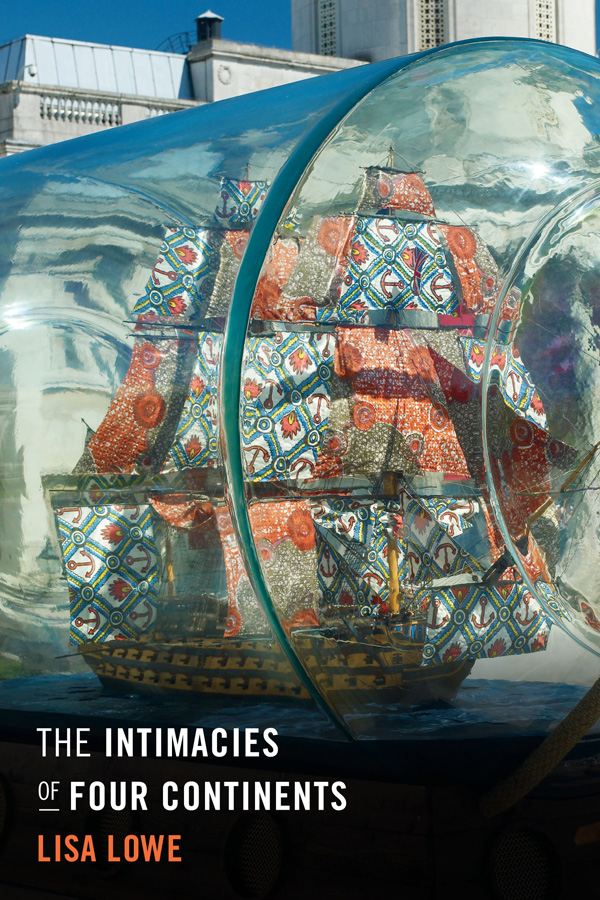Lisa Lowe: The Intimacies of Four Continents (2015)
Filed under book | Tags: · 1700s, 1800s, abolitionism, asia, black people, capitalism, colonialism, dialectic, governance, history, imperialism, indigenous peoples, intimacy, knowledge, labour, liberalism, marxism, narrative, race, slavery, trade, united states, violence

“In this uniquely interdisciplinary work, Lisa Lowe examines the relationships between Europe, Africa, Asia, and the Americas in the late eighteenth- and early nineteenth- centuries, exploring the links between colonialism, slavery, imperial trades and Western liberalism. Reading across archives, canons, and continents, Lowe connects the liberal narrative of freedom overcoming slavery to the expansion of Anglo-American empire, observing that abstract promises of freedom often obscure their embeddedness within colonial conditions. Race and social difference, Lowe contends, are enduring remainders of colonial processes through which “the human” is universalized and “freed” by liberal forms, while the peoples who create the conditions of possibility for that freedom are assimilated or forgotten. Analyzing the archive of liberalism alongside the colonial state archives from which it has been separated, Lowe offers new methods for interpreting the past, examining events well documented in archives, and those matters absent, whether actively suppressed or merely deemed insignificant. Lowe invents a mode of reading intimately, which defies accepted national boundaries and disrupts given chronologies, complicating our conceptions of history, politics, economics, and culture, and ultimately, knowledge itself.”
Publisher Duke University Press, Durham, NC, June 2015
ISBN 9780822358633, 0822358638
319 pages
Discussion: Gayatri Gopinath, Alyosha Goldstein, Moon-Ho Jung, Stephanie Smallwood (book roundtable at ASA Conference, Toronto, 2015, video).
Reviews: John Holmwood (Theory, Culture & Society, 2016), Betty Joseph (American Historical Review, 2016), Hossein Ayazi (Qui Parle, 2016), Michael Gaffney (Journal of American Studies, 2016), Adam Nemmers (Women’s Studies, 2016), Marion C. Rohrleitner (Pacific Historical Review, 2016), Lance Bertelsen (Modern Philology, 2017), Harrod J Suarez (Melus: Multi-Ethnic Literature of the U.S., 2017), Jesse van Amelsvoort (Nexus Instituut, n.d.), Hadley Howes (Antipode, 2020).
Larry Shiner: The Invention of Art: a Cultural History (2001)
Filed under book | Tags: · 1700s, 1800s, aesthetics, art, art history, history

“With The Invention of Art, Larry Shiner challenges our conventional understandings of art and asks us to reconsider its history entirely, arguing that the category of fine art is a modern invention—that the lines drawn between art and craft resulted from key social transformations in Europe during the long eighteenth century.”
Publisher University of Chicago Press, 2001
ISBN 0226753425, 9780226753423
xix+362 pages
Interview (Platypus Review, 2014)
Review: Mitch Avila (JAAC 2003).
Commentary: Luis Puelles Romero (Contrastes ES 2005), David Clowney (Contemporary Aesthetics 2008).
PDF (18 MB, updated on 2023-5-19)
Comment (0)Humphrey Jennings: Pandæmonium, 1660-1886: The Coming of the Machine as Seen by Contemporary Observers (1985)
Filed under book | Tags: · 1600s, 1700s, 1800s, history of technology, industrial revolution, industry, literature, machine, mechanics, technology, united kingdom

Pandaemonium, 1660-1886 is a book of contemporary observations of the coming, development and impact of the Industrial Revolution in the United Kingdom, collected by documentary film-maker Humphrey Jennings between 1937 and his early death in 1950. His daughter, Mary-Louise Jennings, and a co-founder with Jennings of Mass Observation, Charles Madge, brought his work to publication in 1985. The book takes its title from the first excerpt within it, the section in Book I of Paradise Lost (1660) in which John Milton describes the building of Pandaemonium, the capital city of Hell. (from Wikipedia)
From the New York Times review (1985): “For Humphrey Jennings, Pandaemonium was a prophetic symbol of industrialism, and it provides not only the title but also the starting point of his attempt to chronicle ‘the imaginative history of the Industrial Revolution.’ This was best done, he thought, by letting those who took part in the process speak for themselves, and Milton’s lines usher in a collection of some 370 texts ranging from the 1660’s to the 1880’s – the testimony of scientists, artists, rich men, poor men and a great throng of miscellaneous witnesses. Between them, these passages (or ‘images,’ as Jennings preferred to call them) are meant to provide a composite picture of how contemporaries experienced the triumph of the machine, how it transformed both their outward circumstances and inner lives.” (Review)
The cover above is from the UK edition.
First published by André Deutsch. London, 1985
Edited by Mary-Lou Jennings and Charles Madge
Publisher The Free Press, New York
First American Edition, 1985
ISBN 0029164702
376 pages
via joandleefe
PDF (30 MB)
Comment (0)
